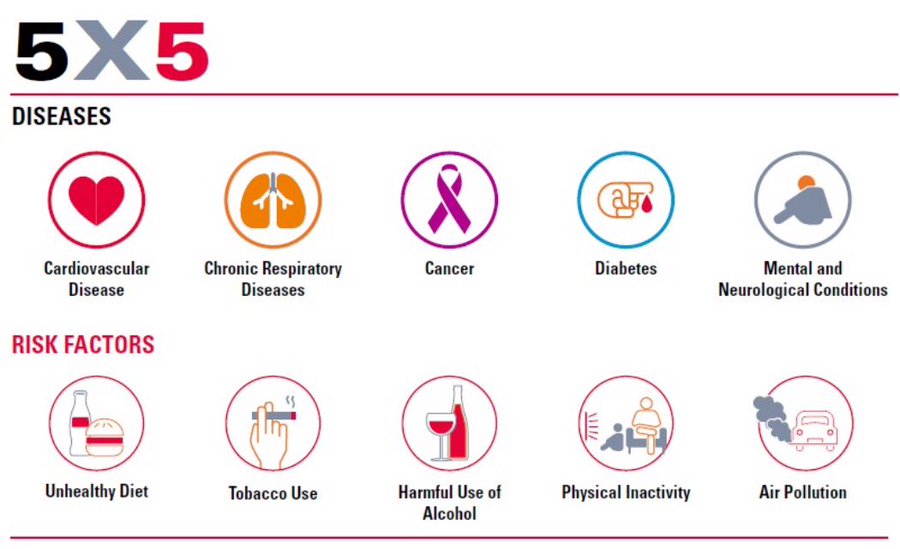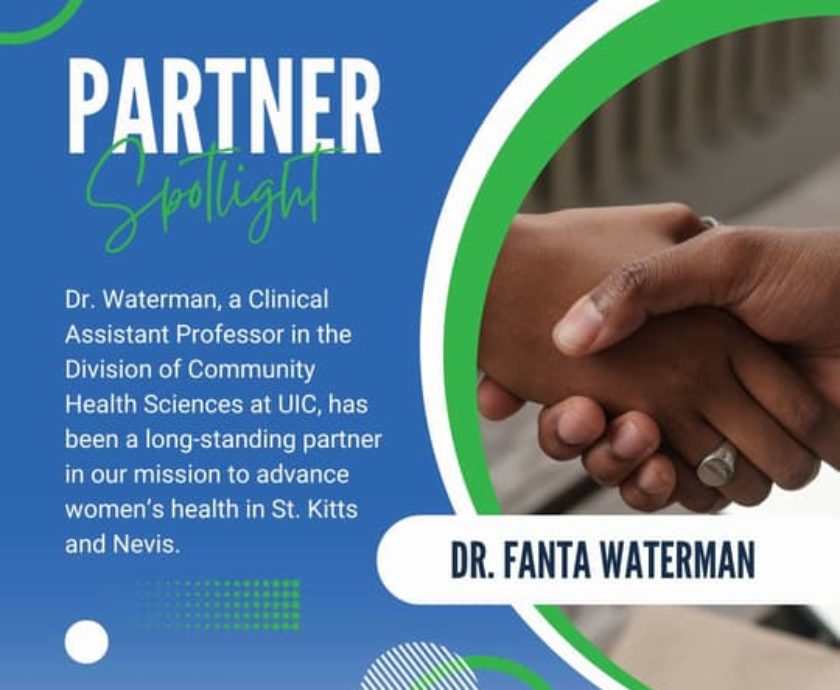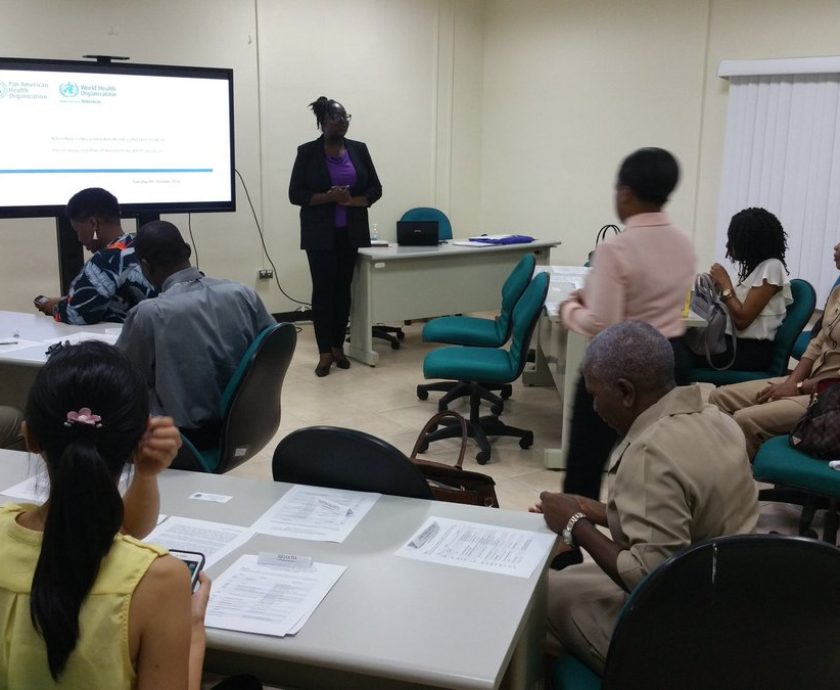When it comes to the prevention and control of non-communicable diseases (NCDs), we may not immediately think that lawyers have a role to play, but to ensure an effective NCD response, lawyers are a very important actor in tackling this public health issue.
The role of lawyers involves using the law as an instrument to facilitate the implementation of an equitable NCD strategy. This is achieved through the development of health-related legislation, treaties and statutes as well as advising on the legalities of Government policy.
One of the core principles of the legal aspect of an NCD response is upholding the public’s right to health.
Health As A Human Right
The World Health Organisation defines health as “a state of complete physical, mental and social well-being and not merely the absence of disease or infirmity” and with this definition in mind, the WHO declares in its constitution that everyone should have “the right to the enjoyment of the highest attainable standard of physical and mental health” and that this right “is one of the fundamental rights of every human being without distinction of race, religion, political belief, economic or social condition.”
Furthermore, the Universal Declaration of Human Rights, Article 25 states that:
Everyone has the right to a standard of living adequate for the health and well-being of himself and of his family, including food, clothing, housing and medical care and necessary social services, and the right to security in the event of unemployment, sickness, disability, widowhood, old age or other lack of livelihood in circumstances beyond his control.
Taken together, these statements mean that we all have the right to achieve the best health possible and we also have the right to access nutritious food, clothing and other such elements to achieve good health.
In furthering the conversation about the right to health, the ‘UN Special Rapporteur on the right to health on the adoption of front-of-package warning labelling to tackle NCDs’, explained that when it comes to the right to health, States have a legal obligation to respect, protect and fulfil. This is the basis of human rights law and can be applied to health in the following ways, as described by CESCR General Comment No. 14: The Right to the Highest Attainable Standard of Health (Art. 12)
- Respect – requires States to refrain from interfering directly or indirectly with the enjoyment of the right to health
- Protect – requires that States to prevent third parties from interfering with a person’s right to health
- Fulfil -requires States to adopt appropriate legislative, administrative, budgetary, judicial, promotional and other measures towards the full realisation of the right to health.
Taking into account the right to health, one of the roles of lawyers in the NCD response is to ensure that the State fulfils their above-mentioned obligations through equitable legislation and policies.
NCD Risk Factors, the Food Environment and Human Rights
In order to implement an effective NCD strategy, one important aspect of the strategy is the prevention of NCDs and most responses focus on the key modifiable risk facts of physical inactivity, an unhealthy diet, tobacco use, harmful use of alcohol and air pollution. This means that countries have and continue to develop laws and policies that address these risk factors.

Through our You’re Sweet Enough campaign, we have been focusing on one of these risk factors, an unhealthy diet. The reason for focusing on this risk factor is to address the concerning state of our food environment; we live in a very unhealthy and obesogenic food environment. This is an environment where unhealthy food is more accessible than healthy options and, furthermore, the pervasive marketing of unhealthy foods is dictating the choices that the public makes. This means that our food system is promoting unhealthy weight gain through the removal of choice and through psychological conditioning of consumers – this is a violation of the right to health, but also is a violation of a number of human rights including:
- The right to information: many foods lack enough information or understandable information about their nutritional content, and therefore the public is unable to make an informed choice about the foods they purchase
- Right to food: the current food environment where unhealthy food is easily accessible means that the public doesn’t have easy access to real, nutritious food
- Right to life: the lack of access to information and food, means that the public is being deprived of the nutritious food that is required to sustain their lives
- Right to scientific progress – researchers have now proved the link between unhealthy foods and NCDs, but industry interference, marketing and manipulation has meant that this evidence is not always reaching the consumer or has taken many years to reach the consumer
- Children’s rights – The UN Convention on the Rights of the Child states that “Children have the right to the best health care possible, clean water to drink, healthy food and a clean and safe environment to live in.”
Lawyers, therefore, must assist the State in developing laws and policies that reverse the obesogenic environment and create a healthy food environment where we can all thrive.
NCD Policies and Laws
Our You’re Sweet Enough project focuses on sugar-sweetened beverages (SSBs) and this is because of their high sugar content. The consumption and overconsumption of SSBs has been linked to the development of obesity and other NCDs such as type two diabetes and some cancers. As a result of this we have be advocating for Government policies and laws to create a healthy drinking environment. These policies are evidence-based and have been recommended by the World Health Organisation as part of their ‘Best buys’ for the prevention and control of NCDs. These policies include:
- Front of package warning labels on SSBs to provide consumers with a quick and easy way of identifying beverages that are high in sugar
- The restriction of the sale and marketing of SSBs to children
- The introduction of an excise tax of at least 20% on SSBs to reduce the purchase and consumption of these products
Currently, the Government of St. Kitts and Nevis is developing an SSB policy and lawyers can play an instrumental role in the development of this policy by ensuring that these policies are not only effective at preventing and controlling NCDs, but are fair, equitable and protect human rights. Additionally, they must ensure that the policies and legislation are legally sound and can stand up to the interference from the food and beverage industry which in other countries has sought to block or reverse evidence-based healthy food policies.
Building the Capacity of Lawyers
As part of our work to ensure that lawyers are equipped to contribute to the NCD response, we teamed up with the Ministry of Health and the Law and Health Research Unit at the University of the West Indies to host a webinar on the role of law in public health policy. This webinar focused on tobacco control and SSBs and sought to provide lawyers in St Kitts and Nevis with guidance on how they can support the development of tobacco control and SSB policies. Speakers included:
- Dr Marissa Carty, the NCD Programme Coordinator at the Ministry of Health in St Kitts and Nevis
- Nicole Foster, Deputy Dean and Head, Health and Law Research Unity at the University of the West Indies
Welcome remarks were provided by Mr Garth Wilkin, the President of the Bar Association and closing remarks were delivered by Rhonda Nisbett-Browne, Member of the Bar Association
This was a very informative session and we would like to thank Dr Marissa Carty and Nicole Foster for their excellent presentations, the Bar Association for partnering with us and all the lawyers who attended. A recording of the event is below.
Conclusion
Lawyers have a very important role to play in preventing and controlling NCDs. They ensure that the State fulfils its human rights obligations of securing everyone’s right to health by supporting the development of equitable legislation and policies.
Sources
- Office of the United Nations High Commissioner for Human Rights and Word Health Organisation (2008). Right to Health. Factsheet No. 31, June 2008
- UN (1946). Universal Declaration of Human Rights
- UN (1989). Convention of the Rights of the Child
- UN Committee on Economic, Social and Cultural Rights (CESCR), General Comment No. 14: The Right to the Highest Attainable Standard of Health (Art. 12 of the Covenant), 11 August 2000, E/C.12/2000/4, available at: https://www.refworld.org/docid/4538838d0.html [accessed 16 April 2022]
- World Health Organization. (2017). Tackling NCDs: ‘best buys’ and other recommended interventions for the prevention and control of noncommunicable diseases. World Health Organization.https://apps.who.int/iris/handle/10665/259232. License: CC BY-NC-SA 3.0 IGO












